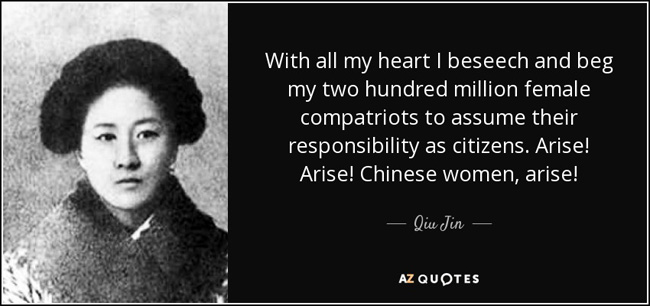Known as China’s first feminist, and celebrated as China’s ‘Joan of Arc’, Qiu Jin was stunningly brilliant in every regard. She embraced an unconventional way of life even as the society she lived in was trying to control her in all aspects. Raised in a conservative Chinese home in the early 1900s, she was forced to bind her feet and enter into an arranged marriage, but after seven years and two children, she decided to unbind her feet and leave to study in Japan.
While there she joined a secret society dedicated to replacing the failing Manchu government with a Han one, dressed in Western male attire, and learned swordplay. She advocated for women’s rights both in word and action, and also wrote poetry, starting a radical women’s journal, which is largely overlooked because of her revolutionary actions that ultimately lead to her torture and death at the age of 31.
She believed that simply demanding equality was not enough; women had to be ready to fight for it, too. Historians today declare her actions alone were rebellion, considering that women were expected to be silent, stay at home, and raise children.
Today she is buried in Hangzhou along West Lake, and hundreds of people still visit her tomb and pay their respects. This short biography I have written does not give her the proper acclaim she deserves by any means, as it is just a short summary, but instead of going into more detail, as other articles (and a NYT obituary) do, I prefer to leave you with some examples her poetry, as it an aspect that is often overlooked for other, more exciting parts of her life.
“Capping Rhymes with Sir Ishii From Sun’s Root Land”
Don’t tell me women are not the stuff of heroes,
I alone rode over the East Sea’s winds for ten thousand leagues.
My poetic thoughts ever expand, like a sail between ocean and heaven.
I dreamed of your three islands, all gems, all dazzling with moonlight.
I grieve to think of the bronze camels, guardians of China, lost in thorns.
Ashamed, I have done nothing; not one victory to my name.
I simply make my war horse sweat. Grieving over my native land
hurts my heart. So tell me; how can I spend these days here?
A guest enjoying your spring winds?
Or this one, written upon leaving for Japan:
Sun and moon have no light left, earth is dark;
Our women’s world is sunk so deep, who can help us?
Jewelry sold to pay this trip across the seas,
Cut off from my family I leave my native land.
Unbinding my feet I clean out a thousand years of poison,
With heated heart arouse all women’s spirits.
Alas, this delicate kerchief here
Is half stained with blood, and half with tears.
And finally, this snippet from a 1903 poem:
My body will not allow me
To mingle with the men
But my heart is far braver
Than that of a man.
Well-recognized in China, she is almost unknown in the Western world, although there was a documentary, called “Autumn Gem”, which a direct translation of her name, made in 2009. I am still trying to find out how to watch it, if I find a way I will let you all know!

